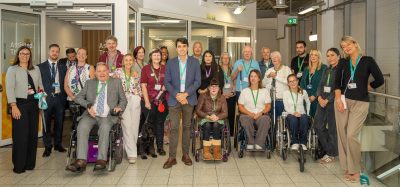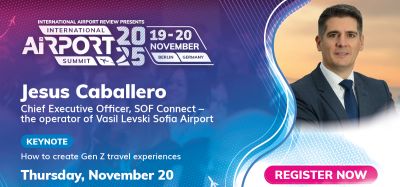Edmonton International Airport’s new fleet of hydrogen vehicles: the driving force for green energy
Posted: 6 February 2024 | Myron Keehn | No comments yet
Myron Keehn, President & CEO of Edmonton Airports, discussed in Issue 4, bringing the first-ever fleet of hydrogen fuel cell electric passenger vehicles to Alberta’s roadways.
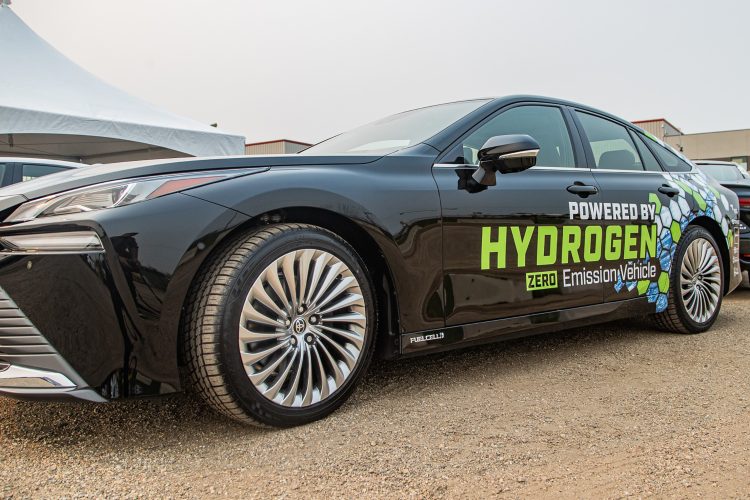

Edmonton International Airport 's new fleet of hydrogen vehicles. CREDIT: EDMONTON INTERNATIONAL AIRPORT
Green hydrogen has accelerated from vision to reality at Edmonton International Airport (YEG). July 2023 marked a significant moment in history as YEG introduced the first-ever fleet of zero-emission hydrogen fuel cell electric vehicles (FCEVs) to Western Canada’s province of Alberta.
Thanks to an innovative partnership with Toyota Canada, we were thrilled to unveil the bold, innovative, sleek-looking Toyota Mirai hydrogen cars on roadways around the airport and beyond. The Mirai vehicles use revolutionary fuel cell technology to make electricity from hydrogen and oxygen, with water as the only tailpipe emission.
Alberta will make the world’s cheapest clean hydrogen, fuelling much of the energy transition for Western Canada’s aviation sector”
What’s most impressive is their range of up to 647km and the quick refuelling time of about five minutes, highlighting the practicality of hydrogen fuel cell technology as a viable solution for long-distance travel and efficient refuelling.
Edmonton International Airport is ready for the evolution of energy
Surrounded by vast prairie landscapes, YEG is the largest in the country by land size, with over 7,000 acres in our care. We are located just outside the vibrant capital city of Edmonton, Alberta, the largest northernmost metropolis in North America.
YEG sits in a region with natural advantages in hydrogen production that cannot be understated. From robust energy infrastructure and expertise to enormous reserves of the necessary feedstocks and unlimited carbon capture and storage potential – Alberta will make the world’s cheapest clean hydrogen, fuelling much of the energy transition for Western Canada’s aviation sector.
YEG is working with the Edmonton Region Hydrogen HUB, Canada’s first and largest hydrogen hub, to help position our region at the centre of Canada’s emerging hydrogen economy and drive demand for hydrogen across various sectors.
Airports can show the world that decarbonisation is attainable, and using hydrogen fuel is part of the solution. Here at YEG, we recognise the importance of fostering fuel switching for our airport operations and our ecosystem partners to decrease emissions. We are ready to demonstrate globally that the aviation sector can decarbonise, thanks to Alberta’s strengths in clean energy production.
YEG is using our expansive space on our Airport City Sustainability Campus to develop the infrastructure to accommodate new fuel regimes and bridge the future to a net-zero aviation industry. Our campus has attracted over $1.5 billion in private investment from local and international partners over the past decade, which is the most of any airport in North America.
For the past several years, we have been collaborating with global companies to share our vision and create partnerships in using our airport as a testing location for delivering zero-emission flights, decarbonising ground operations, developing hydrogen fuelling stations and converting industrial vehicles to hydrogen fuel.
Today, our new fleet of Toyota Mirai hydrogen-powered vehicles is truly the beginning of the next era in Alberta. We are excited to showcase what hydrogen-powered products can do, reducing emissions and helping our airport reach its goal of net zero by 2040.
Over the next year, YEG is gradually phasing 100 of the Mirai vehicles into our fleet. They will be used for airport operations and by various partners within our ecosystem, such as taxi companies and car rental services.
Hydrogen refuelling
Of course, bringing in passenger FCEVs means they need somewhere to refuel. YEG is fortunate to have the space to build the infrastructure necessary to create a hydrogen fuel hub.
The Mirai vehicles use revolutionary fuel cell technology to make electricity from hydrogen and oxygen, with water as the only tailpipe emission”
We have established an interim mobile hydrogen refuelling station for our fleet and have set our sights on developing permanent hydrogen refuelling stations on-site, at the airport. Our goal is to ensure fuel switching is economical and a positive experience, and we are evaluating our options to ensure long-term sustainability.
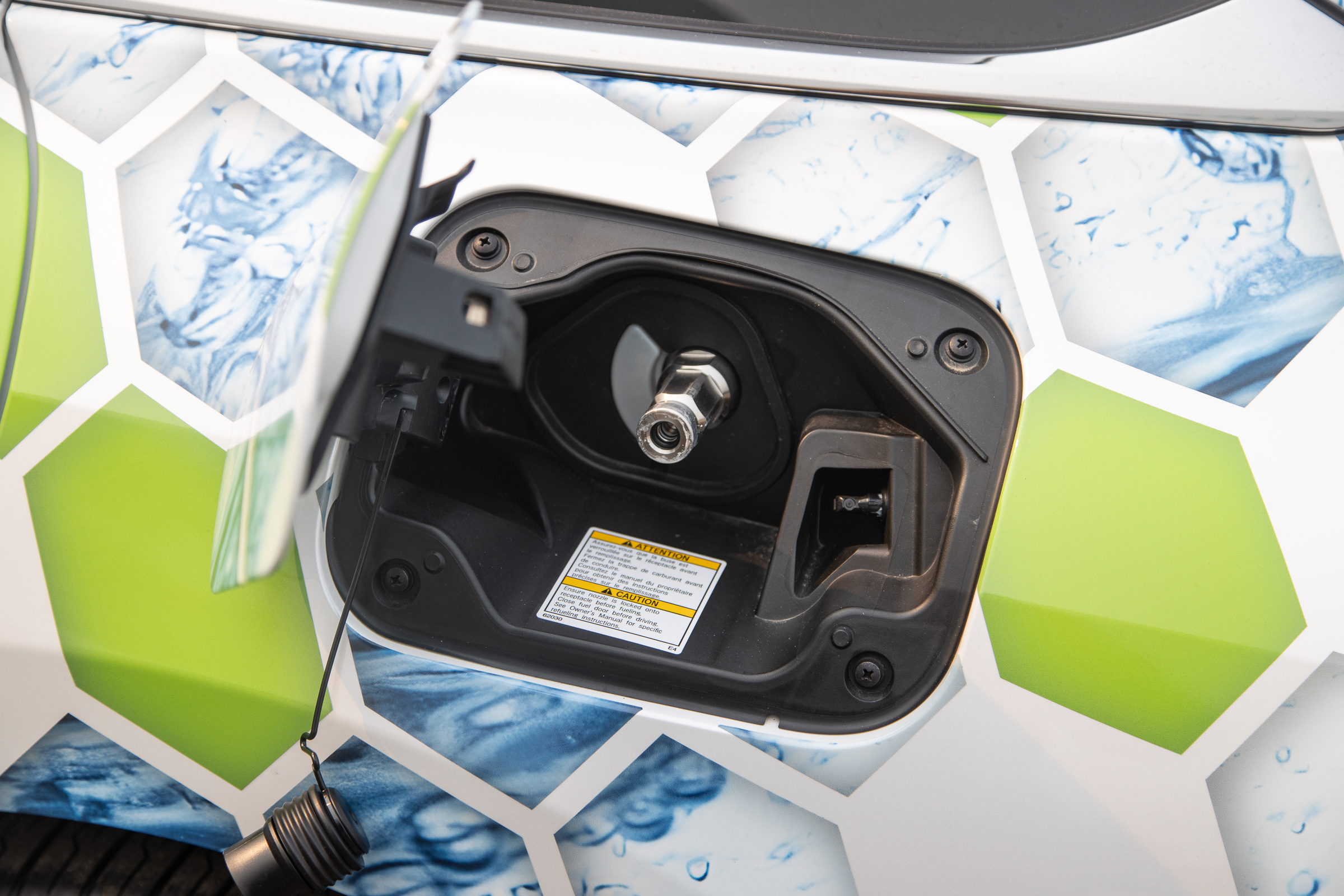

Hydrogen car refuel. CREDIT: EDMONTON INTERNATIONAL AIRPORT
Our fleet of Mirai’s will play a significant role in creating demand for hydrogen that will lead to supply, create jobs, and bring new investments into our region. This fleet will be part of the region’s ultimate goal of getting 5,000 hydrogen or dual-fuel hydrogen vehicles on Western Canada’s roads within five years. The 5,000 Hydrogen Vehicle Challenge initiative is led by the Edmonton Region Hydrogen HUB, which brings together industry leaders and champions from across the entire hydrogen value chain to demonstrate there is demand for fuelling station operators, original equipment manufacturers, service providers and production and transportation companies.
Alberta airports will access some of the cheapest hydrogen products in the world
Alberta’s natural advantages in clean hydrogen production are a game-changer for the global aviation sector. Our province has abundant resources, mature infrastructure, suitable geology for Carbon Capture, Storage and Utilisation (CCUS), and expertise in energy production.
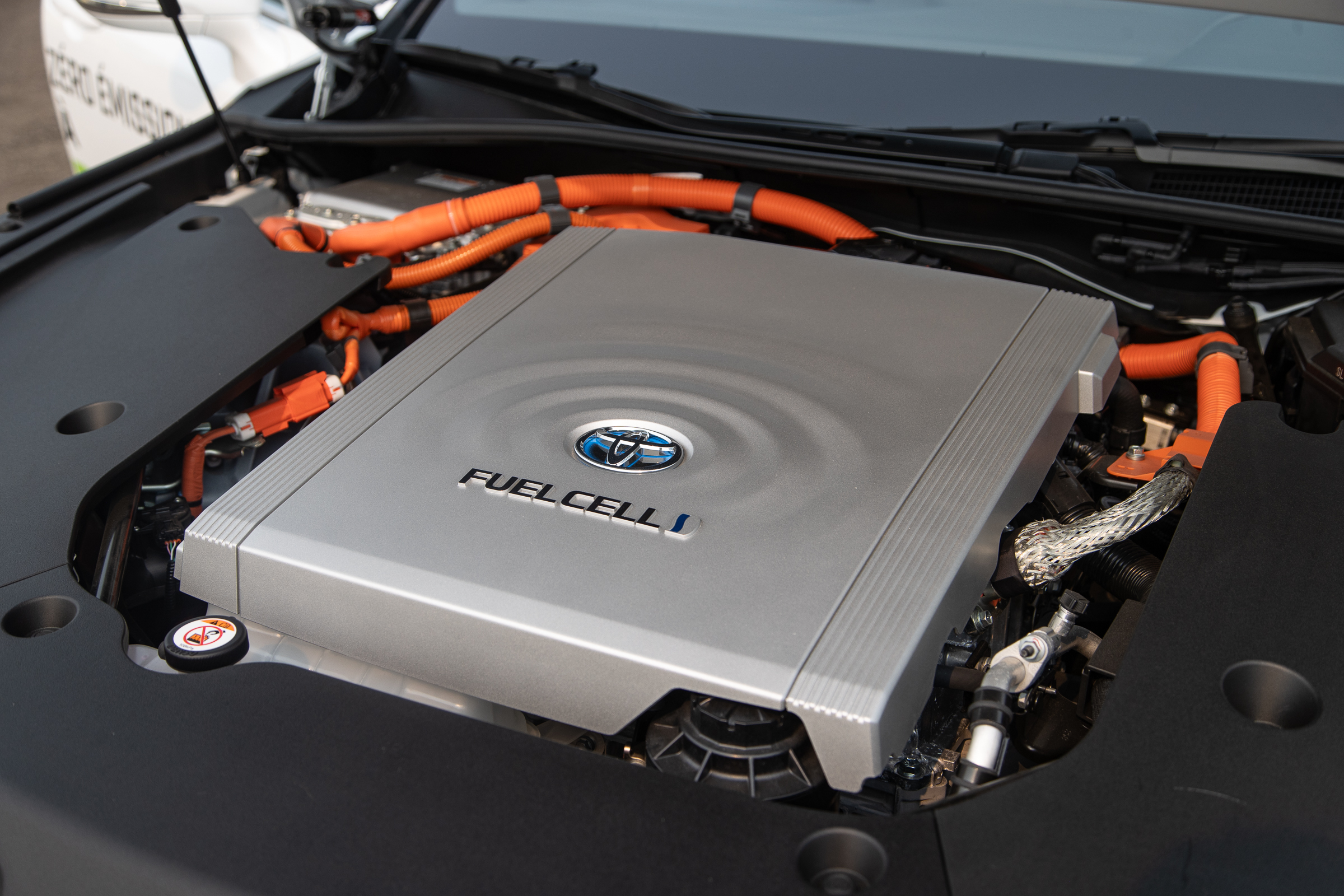

Hydrogen car fuel cell. CREDIT: EDMONTON INTERNATIONAL AIRPORT
Canada is already one of the top 10 global hydrogen producers and, with many years of R&D, a leader in innovative hydrogen and fuel cell technologies. Alberta currently produces about 2.5 million tonnes of hydrogen annually, making it Canada’s largest hydrogen producer.
These natural advantages will give Alberta airports, such as YEG, access to some of the cheapest hydrogen products in the world, unlocking a plethora of opportunities to decarbonise a traditionally hard-to-abate sector.
What’s next for hydrogen at Edmonton International Airport?
Our airport continues to bring together local and international companies to collaborate in testing new technologies and showcase the power of emissions-free hydrogen fuels.
We are ready to demonstrate globally that the aviation sector can decarbonise, thanks to Alberta’s strengths in clean energy production”
Beyond the Toyota Canada partnership, we have signed multiple partnerships with global companies to test innovations in hydrogen, including hydrogen‑powered shuttle buses for on-airport passenger transportation, industrial-vehicle hydrogen fuel conversions, developing hydrogen fuelling stations for public access and furthering exploration about using hydrogen fuel for delivering zero-emission flights.
Currently, YEG is adopting hydrogen fuel technology in our winter operations equipment. We are converting one of our runway truck and sweeper units to a hydrogen dual fuel operation. A first of its kind for winter operations equipment, this new technology will be operating during this upcoming winter season, leading the way in reducing emissions from our snow removal fleet.
As the world’s first airport to sign The Climate Pledge committing to be net zero by 2040, our commitment to hydrogen reflects our values towards environmental, social and governance work. Everything we do is guided by our promise to create meaningful partnerships that protect our airport, manage our environment, grow our region and connect our community to the world.
Our airport is keenly focused on collaboration and sharing information about our learnings with others in our local, national and international networks. We recognise we have a special opportunity to lead the progress in adopting zero emission hydrogen fuel in the aviation industry to ensure the betterment of our region and the world.
As the African proverb states: “If you want to go fast, go alone. If you want to go far, go together”. We are proud to be working with the aviation industry and partners in sustainability to improve the world for future generations.


About the author – Myron Keehn
Myron Keehn is President & CEO of Edmonton Airports in Canada overseeing Edmonton International Airport (YEG) and Villeneuve Airport (ZVL). Myron has 30 years of experience working in the private and public sectors of North and South America, Asia, and Europe.
He has spent 15 years working for Edmonton Airports. In his previous role as Vice President, Air Service & Business Development, he led many innovative developments, including creating the Airport City Sustainability Campus vision.
Myron’s vision and tenacity have helped attract over $1.5 billion of private investment to YEG, and the Airport City Sustainability Campus is now one of only two of its kind in Canada. Myron’s mission as CEO is to recast the role of airports, evolving beyond utilities into economic engines for cities, regions and countries.
Join our free webinar: Transforming Airport Security – Innovation, Impact, and the Passenger Experience
The landscape of airport security is undergoing a profound transformation, driven by evolving threats, technology, and passenger expectations. This webinar focuses on how AtkinsRéalis has been transforming security processes at some of the world’s busiest airports with smarter, more adaptive solutions.
Date: 4 Nov | Time: 14:00 GMT
REGISTER NOW TO SECURE YOUR SPOT
Can’t attend live? No worries – register to receive the recording post-event.
Issue
Related topics
Airport development, Airside operations, Emissions, New technologies, Passenger experience and seamless travel, Sustainability, Sustainable development






